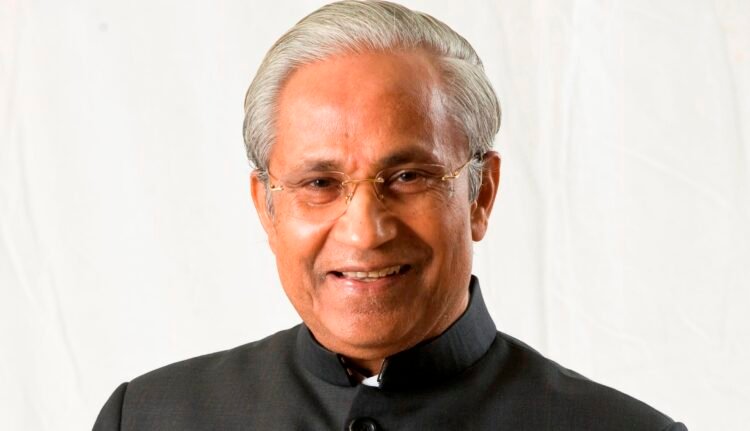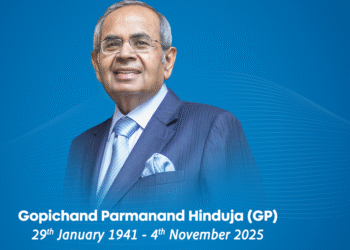Dr. Deshbandhu Gupta – 1938 – 2017
Dr. Deshbandhu Gupta was an Indian billionaire, philanthropist, entrepreneur and the founder of Lupin Limited, a multinational pharmaceutical company. He was born on 8 February 1938 in Rajgarh, Alwar, Rajasthan. He earned a master’s degree in chemistry from Bombay University and started his career as an associate professor at BITS Pilani. He was married to Manju and had five children: four daughters and one son. At the time of his death on 26 June 2017, his net worth was estimated at US$3.6 billion.
Dr. Gupta founded Lupin in 1968 with a start-up capital of Rs. 5000 borrowed from his wife and rented premises for dispatching medicines. Under his leadership, Lupin became a global pharmaceutical company by entering markets across the globe including US and Japan. He also set up the Lupin Human Welfare & Research Foundation (LHWRF) in 1988 to create a model for sustainable rural development. He received several awards and recognition for his entrepreneurial and philanthropic endeavors.
Early life and education
Dr. Gupta was born as the eldest of the five siblings in Rajgarh, Alwar, Rajasthan1. His father, Shadiram, was a petition writer and a Vedic scholar who also wrote Urdu prose and poetry1. He completed his elementary education at a madrasa in Panipat and later pursued his studies at St. Stephen’s College, Delhi2. At St. Stephen’s, he was taught by Charles Indridge and Ghosh, while SK Rudra served as the principal. During his time at the college, he briefly worked as an assistant for Jamnalal Bajaj, a cloth merchant at Chandni Chowk, for a period of 18 days.
During this period, significant events such as the Jallianwala Bagh massacre unfolded, leaving a lasting impact on the public’s collective memory and on young Rati Ram Gupta in particular. As a consequence, after attending a Non-Cooperation Conference led by Mahatma Gandhi in Bhiwani on 22 October 1920, Deshbandhu Gupta felt inspired to actively participate in the struggle for India’s freedom from British rule. He informed the college principal, S.K. Rudra, of his decision to leave St. Stephen’s. Given Rudra’s sympathy towards the revolutionary cause, he accepted Gupta’s request and even encouraged the young Rati Ram to make the most of his choice to serve the freedom struggle2. Swami Shraddhanand and Mahatma Gandhi gave him the title “deshbandhu” (friend of the nation), which became his commonly used name.
He earned a master’s degree in chemistry from Bombay University and started his career as an associate professor at BITS Pilani, Rajasthan13. He quit teaching and decided to be an entrepreneur as he was “not able to implement ideas into practice”4. He moved to Bombay (now Mumbai) and worked in a small British pharmaceutical manufacturing company.
Founding and leading Lupin Limited
He founded Lupin in 1968 with a start-up capital of Rs. 5000 borrowing the money from his wife. The first office of Lupin was rented premises in Central Mumbai used for dispatching medicines. Later, with a loan of Rs. 8 lakh from Central Bank of India, he started a factory whose major order was to provide iron and folic acid tablets to the Government of India programmes related to mother and child healthcare.
Under his leadership, Lupin became a global pharmaceutical company by entering markets across the globe including US and Japan. He pioneered best-in-class treatment protocols in various therapy areas such as anti-TB drugs, cephalosporins, cardiovascular drugs, diabetes drugs etc. Some of the products and innovations that Lupin is known for are Suprax (a pediatric antibiotic), Antara (a cholesterol-lowering drug), Locoid lotion (a topical corticosteroid), Alinia (an anti-parasitic drug) and InspiraChambers (a device for delivering aerosol medication) .
Philanthropy and social impact
He set up the Lupin Human Welfare & Research Foundation (LHWRF) in October 1988. LHWRF was set up with the objective of creating a reproducible and evolving model for sustainable rural development with a simple goal of uplifting families living below the poverty line in rural India. This vision of rural development focuses on holistic development programs that systematically create opportunities and infrastructure, while empowering people in rural areas, to bring about a socio-economic change and ensure the inclusion of rural communities in the nation’s economic progress.
Nationally, the Lupin Foundation impacts the lives of 2.8 million people living in about 3,500 villages spread across 9 states – Rajasthan, Maharashtra, Madhya Pradesh, Goa, Uttarakhand, Gujarat, Jammu, Andhra Pradesh, and Sikkim. The foundation works on various domains such as education, health, livelihood, infrastructure, natural resource management and social justice.
Awards and recognition
He received several awards and recognition for his entrepreneurial and philanthropic endeavors. Some of them are:
Ernst & Young Entrepreneur of the Year Award for 2011 in the healthcare sector
Frost & Sullivan Lifetime Achievement Award in 2013
Hall of Fame at the CNBC TV18 India Business Leader Awards 2018 (posthumously)
Conclusion
Dr. Deshbandhu Gupta was a visionary leader who transformed Lupin into a global pharmaceutical company and made a lasting impact on society through his philanthropic initiatives. He was a role model for many aspiring entrepreneurs and social workers. He died on 26 June 2017 in Mumbai. He is survived by his wife and five children: four daughters and one son. His legacy and contribution to the pharmaceutical industry and society at large will be remembered for generations to come.
Also Read:
- Biography of Isha Ambani: A Leader in Business and Philanthropy
- Rahul Dash: The Co-founder and COO of Purplle – Biography
- Bhavesh Jindal: The Promoter of BC Jindal Group
- M.K. Stalin: The Dravidian leader and Chief Minister of Tamil Nadu
- Biography of Rohit Jawa CEO and MD of Hindustan Unilever India
- Nandan Nilekani: The Tech Visionary Who Transformed India
- NL Mehra: A Visionary Leader who Made Jaquar Group
- Biography of Ravneet Kaur: The First Woman to Head the Competition Commission of India (CCI)






















